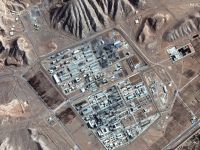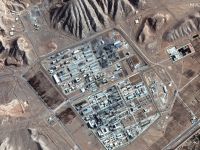By Munir K. Nasser
Washington, DC
A leading Arab American activist criticized Palestinian President Arafat for failing to have an organized public relations effort in the United States to reach out and explain his cause to the American public at large.
Jim Zogby, President of the Arab American Institute, blamed the Palestinians for not having an effective presence in the US with only one office in Washington, which is “not properly staffed or funded.”
Zogby told Albawaba.com in an interview that the PLO office in Washington has done nothing to build allies for the Palestinian cause among American Jews, Blacks and other ethnic groups.
“That is stupid. When the cause is this serious, and the need is this great, to do nothing is wrong,” he stressed.
He announced that he has made a tactical decision not to help the Palestinians in their public relations work. “I was not going to do there their work for them anymore. I have my own work to do now,” he stated. “We can’t stand the battle on this issue by ourselves.”
Zogby also blasted President Clinton and Congress for threatening to cut aid to the Palestinians if they unilaterally declare a state. He described members of Congress working on the motion as “a bunch of clowns trying to play macho over the backs of the most vulnerable party in the world right now, the Palestinians,” he argued
The following are excerpts from the interview:
Q -What is your feeling on Clinton’s threats to cut aid to Palestinians and move the Embassy to Jerusalem?
A- Clinton remarks were unfortunate. Everyone understands that he was attempting to help Barak get through no confidence motions, but they were at best awkward phrasings and at worst they can prove very damaging to the Palestinian side. The President’s instinct is to be protective of the process and to be encouraging for both sides. But in this instance, I don’t think the way he phrased what he said succeeded; it may be helpful to one side, but it is going to be difficult to the other.
Q- Why the change in Clinton’s approach after he was friendly to the Palestinians?
A- It appears that he was disappointed. Frankly I think he is attempting in the short term to help Barak through a very difficult circumstance in Israel. I think his statement was unnecessary and the phrasing was unfortunate because there was a trilateral agreement that was signed at the end of the summit in which all three sides committed to continue the process and avoid unilateral acts. I think the President simply should have pointed to that and there was no need to say anything more. Nevertheless, he remains very committed to the completion of the peace process.
Q- How serious are the motions in Congress to cut aid to the Palestinians if they declare a state?
A- They are nothing. Number one I don’t believe there will be a unilateral declaration, and number two, if there is a state, its success is not going to rise and fall on 100 million dollars from the United States. I always find it disturbing when these silly boys begin to play their gratuitous games to make themselves feel big.
Q- Your recent poll which showed that 66 percent of Americans support the idea of an independent Palestinian state. What does that mean in political terms?
A- What it means that there has been an increasing support developing in America for Palestinian rights. If you look back at the numbers in the 1970’s you find the change is dramatic. Even if you look back at the last five or six years, you see very significant changes. What it means there is an opportunity for the Palestinians to do some important work, and they are not doing that work, and that’s the problem. I think it is very important to build on this growth in positive perceptions, which happened without the Palestinians being involved. That’s the tragedy in all of this. Just think if they have invested and did work here; just think if they engaged in attempting to transform public opinion, that will be very important.
Q- How would the support of the majority of Americans to a Palestinian state be reflected in cutting aid to Palestinians in congress?
A- They wouldn’t cut aid, because public opinion is one thing, and changing public opinion into politics is something else. What the poll results mean simply: this is where the public is, can you organize the public to change attitudes and votes?
Q- In your writings you blame the Palestinians for not doing enough to explain their cause to the American people. What can they do?
A- I argued this case for 20 years; I have written papers for Arafat and I have gone to visit him in all of the capitals where he has headquarters, including in Gaza more recently, in Tunis and in Beirut and told him that they do not have an effective presence here in the United States, their Washington office is not properly staffed or funded. Imagine Hanan Ashrawi was here for three days during the summit and went back, and that’s terrible. And even after they signed Oslo, they did not spend any time here explaining, even to their own community, why they did it. The opposition, like Haidar Abdel Shafi, was here arguing against it, and the leadership wasn’t arguing for it. They do not have an organized effort to reach out and explain their cause to the public at large.
Q- In an interview with Albawaba.com this week, the head of the Palestinian mission in Washington, Hassan Abdel Rahman, said that the US Administration is too powerful to fight in public relations. Do you agree with that view?
A- That is the case that Hassan has been making for 15 years, and what that does? It leaves us abandoned. We have to do the work that they should be doing. And he is part of the reason why there is no effective Palestinian presence, because he keeps arguing back: ‘don’t do it.’ It is a very wrong judgment.
Q- I am surprised that 66 percent of Americans in your poll are sympathetic to the Palestinians in the absence of effective Palestinian work. How do you explain that?
A- It is the media. Despite the fact that the American press is biased, the press is not bad anymore. It has changed since the Intifada. I have been working on this issue longer than anybody else, that fact is that the public is receptive to us, and our cause is very clear and very simple to understand. Twelve years ago, I raised the issue of Palestinian statehood at the Democratic Convention; since then, we have been on an upswing and it continues. But that happened without Palestinian effort on this end.
Q- If you were to offer a sincere advice to the Palestinians, what exactly they need to do to have an effective voice in this country?
A- They need to have a serious Palestinian presence in this city and in this country to deal with the media and the public at large. And not just a face. When Hanan came after Madrid, I said that she should be traveling around the country. She came and sat in the basement of a hotel in Washington. That’s not where she needs to be. When Netanyahu comes, he travels the country. When the Israeli opposition from Lekud came, they traveled across the country speaking to audiences everywhere. We have a respected base of people.
Q- Why do you think the PLO office in Washington is not doing enough?
A- When people like Hassan Abdel Rahman argue that our enemies are too powerful we can’t beat them, that is because the PLO office hasn’t done anything to build our allies. Yes, we are not as strong as the Jewish community, but we have allies in the Jewish community, we have allies in the churches, we have allies among African Americans, and we have allies among all the ethnic groups and the official Palestinian leadership has done nothing to court these people and win them over. Nor any of the other Arabs either; not just the Palestinians, no one has done anything. That is stupid. When the cause is this serious, and the need is this great, to do nothing is wrong.
Q- Are we losing the blame game after the failure of the Camp David summit with everyone in the US blaming Arafat?
A- And there is no one explaining the opposite. You know what? I made a tactical decision on my own; I was not going to do their work for them anymore. I have my own work to do now. If their office is not going to do anything, or send anyone here to work with us, I am not going to be able to do it my self.
Q- You have been known as a good spokesman for the Palestinians for the last 20 years. Are you going to stop doing that now?
A- They have to make the decision that they are going to do it too. We can’t stand the battle on this issue by ourselves. They got to agree to do something.
Q- How presidential candidates Al Gore and George Bush differ in their position on the Middle East?
A- Frankly speaking, there will be no dramatic change on Middle East policy no matter who is elected. If Gore is elected he will follow the same policy as Clinton. Bush will follow the same policy. Just as there was no difference between Bush Administration and the Clinton Administration. Where is the difference? People point to US loan guarantees for Israel. That was part of the pressure to get Lekud out of office. So their refusal to talk or deal with Netanyahu. The minute that Rabin was elected, Bush and Baker gave him the loan guarantees. The current policy will continue, no matter who is in office.
Q- The US Senate this week passed a resolution acknowledging the achievements of Muslim Americans. What is the significance of that decision?
A- Two years ago we sat out to write a piece of legislation and we were trying to do something that would be positive and easy to do. It turned out to be not so easy and we ran into difficulty on the House side, but we were pleased that Senator Spencer Abraham picked it up and it passed. That was an exercise in our ability to help write legislation and work with Senators to adopt it and to pass it. The language issue was a big one. People worked over every word and the fact that it passed was important and I feel very good about it.
Q- What does it exactly mean to Muslim Americans?
A- There is some language in there we were very insistent about keeping that the House side wanted to lose. One of them was not judging a religion by casting negative stereotypes against religion because of a particular doctrine. We were referring to the doctrine of “jihad,” which is misunderstood. Any effort we can make to help change the way that an American Congress speaks about Islam, is so important -- Albawaba.com
© 2000 Al Bawaba (www.albawaba.com)







